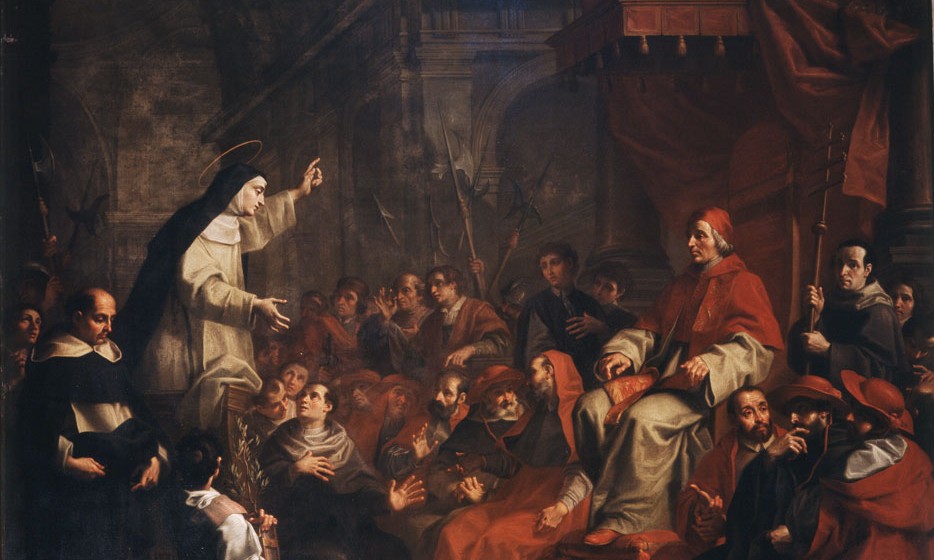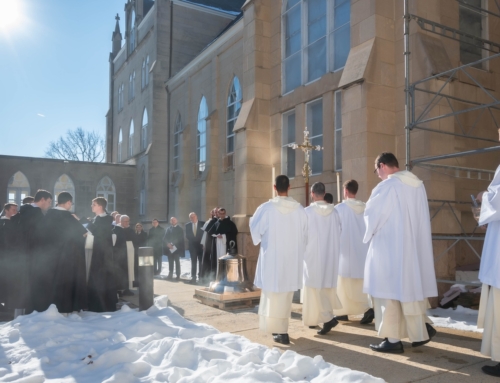Breaking news: there is turmoil in the Church, even amongst her leaders!
This headline has been applicable to the earthly portion of the Church ever since Cardinal Iscariot was caught in a murderous conspiracy ring targeting the Head of the Church, or since a feisty Turkish theologian and evangelist called out the Petrine Authority to be consistent in his application of cultural norms, or since a critic of the papacy, Hippolytus (and indeed an antipope himself!), was martyred with the actual pope, Pontian, the two now being venerated together on a common feast day (August 13).
The response of many Catholics nowadays is to be shocked!—shocked!—that the successors of the apostles should act, well, just like the apostles themselves did. (And for those who blame media coverage, the Proto-Council’s Proto-Blogger Paul [who was the source of information about the Pontifical waffling], also set the precedent for dishing to those who were not privileged to sit in on the proceedings.)
Another response is, like the three famous monkeys, to hunker down and see, hear, and say no evil, as if infallibility extends to every thought and action of the ecclesial hierarchy. I think it’s pretty clear—even to a broad range of persons who may otherwise hold different positions about how the Church should journey through this world—that there are some good things happening at the Synod of the Family in Rome, but also some things not so good.
The worst response is from those who ignore the law of charity in their critiques. They spew venom and spread gossip, calumniate, detract, and pillory all who interfere with their own view of the Church. On the contrary, love of neighbor extends even to the lowliest among us (i.e., professional churchmen), and the exclamation “But it’s true!” is not a cover (detraction is wrong precisely because it reveals true things illegitimately).
So, who can Catholics turn to as a guide in these troubling ecclesial times?
There was a young woman who, if I can guess, would chuckle at our stress concerning the current state of the Church. St. Catherine of Siena lived for only thirty-three years (1347–1380). But, as regards the state of the Roman Church, they were some of the most troubled and problematic years in history, certainly making our 21st-century concerns seem mild in comparison.
In her day, the pope was (literally) at war with Florence and the anti-papal league. The Black Death had ravaged Europe and left both Church and state in shambles. The pope was an absent father: the bishop of Rome was hiding in Avignon. And towards the end of Catherine’s life began the great Western Schism, which saw two, and later three, claimants to the papacy.
Catherine was at first a nobody. Yet seeing the terrible state of the leadership of the Church did not cause her to despair, nor did it make her close herself off and pretend it wasn’t happening. Prompted by Jesus, her mystical Spouse, she wrote many letters throughout her life, with strong language such as this letter addressed to Pope Gregory XI in his exile, chastising Church leaders for their petty wars while Christians in the East were being persecuted by the now-dominant Muslims:
[Bringing in new converts in the East] would help eliminate the vice and sin, the pride and filth that are rampant among the Christian people—especially among the prelates, pastors, and administrators of holy Church who have turned to eating and devouring souls, not converting them but devouring them! And it all comes from their selfish love for themselves, from which pride is born, and greed and avarice and spiritual and bodily impurity. They see the infernal wolves carrying off their charges and it seems they don’t care. Their care has been absorbed in piling up worldly pleasures and enjoyment, approval and praise. And all this comes from their selfish love for themselves. For if they loved themselves for God instead of selfishly, they would be concerned only about God’s honor and not their own, for their neighbors’ good and not their own self indulgence.
Catherine the mystic had become Catherine the ecclesial agitator, even though she never abandoned the cloister of her heart nor her espousal to Christ. In fact, it was in response to the command of Jesus that she gave up her preference for being totally secluded with Him and instead engaged the world.
Catherine is the model for this sensitive engagement with the hierarchy. In her letters to the Holy Father, cardinals, and other Church leaders, she constantly encouraged them to exercise well their lofty offices, not by publishing tracts against them but by pleading with them in filial piety for a resolution to the awful conflicts within the ecclesiastical government.
God in His Providence takes care of His Church until the end of time, but He chooses to do so through brave “nobodies” like Catherine. None of us are above the grittiness of life in the Church. May St. Catherine of Siena pray for us that we not be squeamish in tending the Church’s wounds.
✠
Image: Alessandro, Catherine exhorts Gregory XI







